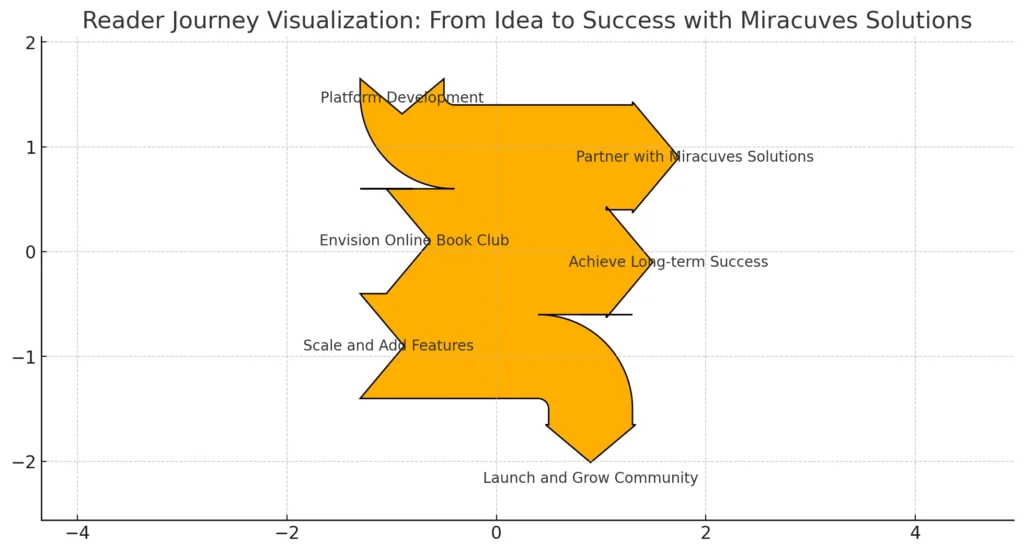In recent years, online book clubs have transformed the way people connect, share, and discover books. These virtual communities bring together readers from all corners of the globe, creating a space where people can discuss literature, exchange ideas, and build lasting connections. Unlike traditional in-person book clubs, online book clubs offer the flexibility of joining discussions from the comfort of home, which has contributed to their growing popularity.
As reading habits evolve, there’s an increasing demand for digital experiences that cater to book enthusiasts. Virtual book clubs meet this need by offering unique formats, such as genre-specific groups, live author Q&As, and exclusive reading lists. With the convenience of digital platforms and a limitless audience, starting an online book club business has never been more promising. It’s a business that taps into the love for books while building a loyal, engaged community.
This article explores ten creative and profitable ideas for launching an online book club business. Whether you’re passionate about a specific genre or eager to create an inclusive space for diverse voices, these ideas offer a starting point for building a vibrant book community.
Why Choose an Online Book Club Business?
Starting an online book club business offers a unique opportunity to create a community that celebrates reading, fosters learning, and connects like-minded individuals. In today’s fast-paced world, people are looking for accessible ways to indulge in their hobbies, and an online book club provides just that—a space where book lovers can discuss ideas, share perspectives, and discover new genres without the limitations of physical locations.
1. Growing Demand for Digital Communities
With the rise of social media and digital platforms, people are increasingly turning to online communities for connection. Virtual book clubs give readers the chance to join discussions from anywhere, making it easier than ever to connect with others who share similar interests. This demand for digital spaces allows online book clubs to tap into a large, engaged audience.
2. Flexible and Accessible for All
Unlike traditional book clubs, which require physical attendance, online book clubs offer flexibility in how and when members participate. Busy schedules, family commitments, and geographical barriers no longer stand in the way of meaningful discussions. This flexibility also opens doors for people who might not have access to local book clubs.
3. Diverse Revenue Streams
An online book club can be monetized in various ways, from membership subscriptions and virtual events to exclusive content and book recommendations. Offering paid memberships for premium access or partnering with publishers for sponsored content are just a few ways to turn an online book club into a profitable business. Diversifying revenue streams helps create a sustainable model that grows over time.
4. Niche Communities and Personalized Experiences
Many readers seek out book clubs that cater to specific genres, themes, or personal interests. By creating niche communities, online book clubs can offer more personalized experiences, making members feel more connected and engaged. For example, a mystery book club or a group dedicated to self-help books can foster discussions that go beyond general book talk, providing deeper value to its members.
5. Endless Growth Potential
With a limitless online audience, an online book club can scale in ways that traditional book clubs cannot. From small, intimate groups to large-scale global communities, there’s potential to grow and diversify as the club gains popularity. This scalability allows entrepreneurs to explore different formats, events, and even collaborations with authors, creating a dynamic and evolving platform.

Current Trends and Future Opportunities in Online Book Clubs
The online book club industry is rapidly evolving, with new trends and innovations shaping the way readers connect and engage. By understanding these trends, aspiring entrepreneurs can identify niche opportunities and create unique online book clubs that stand out.
1. Niche Book Clubs for Specific Genres and Themes
One of the biggest trends in online book clubs is the rise of niche communities that focus on specific genres, authors, or themes. Instead of catering to general readers, niche book clubs offer members a more tailored experience, allowing them to dive deep into their favorite topics, like mystery novels, self-help books, or historical fiction. These specialized clubs attract devoted readers and create a strong sense of community.
2. Integration of Audio and E-Books
With digital reading formats becoming more popular, many online book clubs are incorporating e-books and audiobooks into their discussions. Members can choose how they want to read—listening to an audiobook or reading a digital copy—adding flexibility and making it easier for busy members to participate. This trend also appeals to those who enjoy audiobooks for on-the-go reading.
3. Virtual Author Events and Q&A Sessions
Another exciting trend is the inclusion of virtual author events and live Q&A sessions. Book clubs that host virtual meetings with authors give members a chance to connect with the minds behind their favorite books, ask questions, and gain unique insights into the stories. These exclusive events create memorable experiences for members, enhancing engagement and building loyalty.
4. Gamified Reading Challenges
To make reading more interactive, some online book clubs have started gamifying the experience by setting up reading challenges, point systems, and rewards. These challenges encourage members to read more and explore new genres while fostering a fun, competitive atmosphere. Gamification not only enhances member engagement but also helps attract a younger audience eager for interactive experiences.
5. Community-Driven Book Recommendations
Unlike traditional clubs where moderators select the books, community-driven book clubs allow members to recommend and vote on books they’d like to read. This democratic approach increases member participation and ensures that the selected books reflect the interests of the entire group, keeping everyone more invested in the club’s activities.
As online book clubs grow, integrating various reading formats enhances member engagement. Many clubs are now incorporating audiobooks to offer members flexibility in how they experience the chosen book, whether they’re listening on their commute or reading traditionally at home. This approach makes the club accessible to more members, catering to diverse reading preferences.
| Trend | Description | Opportunities |
|---|---|---|
| Niche Book Clubs | Focused on specific genres or themes | Builds strong, loyal communities |
| Audio and E-Book Integration | Offers multiple reading formats | Increases accessibility and flexibility |
| Virtual Author Events | Live discussions with authors | Enhances engagement and adds exclusivity |
| Gamified Reading Challenges | Interactive reading goals and rewards | Appeals to younger, interactive-focused readers |
| Community-Driven Book Selection | Members recommend and vote on books | Boosts engagement through democratic selection |
Also know:- Most Profitable Travel booking platform to Launch in 2025
Top 10 Ideas for Online Book Club Business Startups
| Business Idea | Startup Cost Range | Target Audience | Revenue Streams |
|---|---|---|---|
| Genre-Specific Book Club | Low to Medium | Genre enthusiasts | Memberships, partnerships |
| Audiobook Club | Medium | Audiobook fans | Subscriptions, sponsored content |
| Author-Collaborative Club | Medium | Readers wanting author interactions | Ticketed events, premium memberships |
| Self-Improvement Club | Low to Medium | Personal growth enthusiasts | Workshops, memberships |
| Young Adult Book Club | Medium | Teens, young adults | Memberships, merchandise |
| Classics Revisited Club | Low | Fans of classic literature | Memberships, themed events |
| Diverse Voices Club | Medium | Socially conscious readers | Memberships, donations |
| Monthly Subscription Box | High | Book lovers who enjoy unboxing experiences | Subscription fees, affiliate partnerships |
| Interactive Challenges Club | Low to Medium | Competitive readers, young audiences | Memberships, sponsorships |
| Binge-Reading Series Club | Medium | Series fans | Memberships, merchandise |
1. Genre-Specific Book Club
Create a book club that focuses on a particular genre, such as mystery, fantasy, or historical fiction. This approach attracts dedicated readers who share a passion for specific genres, building a loyal and engaged community.
- Target Audience: Genre enthusiasts looking for in-depth discussions
- Revenue Streams: Membership fees, exclusive content, and partnerships with publishers
2. Audiobook Club
Develop a book club dedicated to audiobooks, perfect for members who enjoy listening to books on the go. This type of club can host discussions, share listening tips, and even bring in narrators for live Q&A sessions.
- Target Audience: Busy individuals and audiobook fans
- Revenue Streams: Membership subscriptions and sponsored audiobook recommendations
3. Author-Collaborative Book Club
Collaborate with authors to host book clubs that feature live discussions and Q&A sessions with the authors themselves. These sessions provide a unique experience, allowing members to interact with authors directly.
- Target Audience: Readers seeking exclusive interactions with authors
- Revenue Streams: Ticketed events and premium memberships
4. Self-Improvement and Personal Growth Club
Create a book club focused on self-help and personal development books. This type of club can include discussions, journaling prompts, and goal-setting exercises, offering members a transformative experience.
- Target Audience: Individuals interested in personal growth and motivation
- Revenue Streams: Memberships, workshops, and coaching sessions
5. Young Adult (YA) Book Club
Cater to younger readers or fans of young adult literature with a YA-focused book club. This club can include popular series, author events, and even gamified challenges to keep younger members engaged.
- Target Audience: Teens, young adults, and YA genre fans
- Revenue Streams: Membership fees, exclusive author events, and merchandise
6. Classics Revisited Club
Develop a club that dives into classic literature, exploring timeless works by authors like Jane Austen, Mark Twain, and Charles Dickens. Members can enjoy in-depth discussions and historical insights on the era and themes.
- Target Audience: Fans of classic literature and lifelong learners
- Revenue Streams: Memberships and themed events
7. Diverse Voices and Inclusive Stories Club
Focus on promoting diverse authors and stories from around the world. This type of club emphasizes inclusivity and allows readers to discover new perspectives and underrepresented voices.
- Target Audience: Readers interested in cultural diversity and social issues
- Revenue Streams: Memberships, donations, and partnerships with social organizations
8. Monthly Book Subscription Box
Pair the online club with a physical subscription box that delivers books and themed goodies each month. Members can read along with the club and enjoy curated items that enhance their reading experience.
- Target Audience: Readers who love unboxing and surprises
- Revenue Streams: Monthly subscription fees and affiliate partnerships
9. Interactive Reading Challenges Club
Create a club where members participate in reading challenges, earn points, and achieve badges. This gamified approach encourages more reading and appeals to those who enjoy setting and achieving goals.
- Target Audience: Competitive readers and young audiences
- Revenue Streams: Memberships, sponsorships, and branded merchandise
10. Binge-Reading Book Series Club
For readers who love immersive experiences, offer a club dedicated to reading entire book series back-to-back. This club could focus on popular series, offering group discussions and themed events as members progress through each book.
- Target Audience: Fans of series like Harry Potter, Lord of the Rings, and more
- Revenue Streams: Membership fees and exclusive series-themed merchandise
Real-World Examples
Several successful online book clubs have paved the way, showcasing how creative concepts and community engagement can build a thriving virtual reading space. These real-world examples illustrate the potential of online book clubs and provide inspiration for budding entrepreneurs.
One standout example is a genre-specific book club focused entirely on thrillers and mystery novels. This club has attracted a loyal following of mystery enthusiasts who dive deep into plot twists, dissect clues, and engage in lively debates. By tapping into a specific genre, this club creates a highly interactive experience where members share theories and recommendations, building a strong, engaged community.
Another popular model is the self-improvement book club. This club caters to readers passionate about personal growth, hosting monthly discussions on books related to mindset, productivity, and wellness. By including goal-setting sessions and practical exercises, the club helps members apply insights from the books to their own lives, offering a transformative experience that goes beyond reading.
The audiobook-focused club is also a unique success story. This club targets readers who prefer listening to books rather than reading them traditionally. Members share audiobook recommendations, exchange listening tips, and even participate in live discussions with audiobook narrators. This format provides convenience and flexibility for busy readers, enhancing their engagement by meeting them where they are.
Lastly, the diverse voices book club has carved out a space for readers interested in exploring books by underrepresented authors. Each month, the club highlights a different cultural perspective, creating a welcoming space for readers to learn about new experiences and discuss social issues. This focus on diversity resonates with readers who seek more inclusive and meaningful reading experiences.
| Book Club Model | Success Rate (%) | Common Challenges |
|---|---|---|
| Genre-Specific Book Club | 85% | Keeping content fresh and engaging |
| Self-Improvement Book Club | 80% | Maintaining ongoing motivation |
| Audiobook-Focused Book Club | 75% | Adapting to different listening preferences |
| Diverse Voices Book Club | 82% | Managing sensitive discussions respectfully |
Read more: –Top 10 Ideas for Mobile Spa Services Business Startups
Mistakes to Avoid When Starting an Online Book Club Business
Launching an online book club business is an exciting endeavor, but there are common mistakes that can hinder growth and engagement. Being mindful of these pitfalls will help create a thriving community that keeps members coming back for more.
1. Neglecting Community Engagement
One of the biggest mistakes is focusing too much on content delivery and not enough on community interaction. An online book club thrives when members feel connected and valued. Encourage discussions, respond to comments, and create spaces where members can engage openly. Ignoring engagement can make the club feel one-sided, leading to a loss of interest.
2. Not Defining a Clear Niche
Creating a book club that tries to appeal to everyone often results in diluted interest. It’s essential to have a clear focus—whether it’s a specific genre, age group, or reading format. Defining a niche attracts a dedicated audience and makes the club feel more personalized. Avoiding this clarity can lead to a disjointed community with inconsistent participation.
3. Inconsistent Content and Meetings
Consistency is key in an online book club. If meetings or content updates are sporadic, members may lose interest. Stick to a regular schedule for book discussions, author Q&As, or reading challenges to build trust and anticipation. Unpredictable schedules can lead to reduced engagement and lost members.
4. Overloading Members with Too Many Books
Another common mistake is assigning too many books at once. Most readers join a book club to explore one title at a time and have in-depth discussions. Overloading members can make the experience feel like a chore rather than an enjoyable activity. Keep book selections manageable, focusing on quality over quantity.
5. Ignoring Member Feedback
Failing to listen to members’ feedback can hurt the club’s growth. Encourage members to share their thoughts on book selections, discussion formats, or events. Ignoring feedback may lead to frustration and disinterest. Being receptive to suggestions not only improves the club but also shows members that their opinions matter.
A common mistake is neglecting community engagement, which can make the club feel impersonal. Successful online book clubs prioritize interaction by creating discussion threads, hosting polls, and encouraging member participation. Maintaining active engagement fosters a vibrant, loyal community that keeps members coming back.
| Mistake | Impact | Solution |
|---|---|---|
| Neglecting Community Engagement | Reduced member interest | Foster interaction and create discussion spaces |
| Not Defining a Clear Niche | Disjointed and inconsistent community | Focus on a specific genre or theme |
| Inconsistent Content and Meetings | Loss of trust and participation | Stick to a regular schedule |
| Overloading Members with Books | Members feel overwhelmed | Limit selections to one book at a time |
| Ignoring Member Feedback | Member frustration and disinterest | Actively seek and implement feedback |
Why Trust Miracuves Solutions for Your Online Book Club Platform?
Building a successful online book club requires more than just a passion for books—it takes a reliable and innovative platform that can support community growth, engagement, and seamless user experiences. Miracuves Solutions is the perfect partner for those looking to launch a dynamic and thriving book club platform, with a range of tailored solutions that bring your vision to life.
1. Customized Features for Community Engagement
Miracuves Solutions understands the importance of community in an online book club. Their platforms are designed with interactive features like discussion forums, live chat, and voting polls, ensuring that members feel connected and involved. These features help foster lively discussions and make the platform feel like a home for readers.
2. Fast and Cost-Effective Development
Launching quickly without sacrificing quality is crucial in today’s competitive market. Miracuves Solutions delivers platforms up to 30 times faster than industry standards, making it possible to establish your online book club without delay. Additionally, with development costs at only 10% of the global average, Miracuves provides cost-effective solutions that don’t compromise on quality.
3. Scalable Technology to Grow with Your Club
As your online book club grows, so will the demands on your platform. Miracuves Solutions offers scalable technology that expands effortlessly, allowing you to add new features, support more members, and offer enriched experiences without disruptions. This scalability ensures that your book club can evolve as your community grows.
4. Continuous Support and Future-Ready Features
Miracuves Solutions provides ongoing support, keeping your platform updated with the latest technology and ensuring a smooth experience for your members. Their team is ready to assist with updates and new feature integrations, helping you stay ahead in the digital book club industry and offering innovative experiences for your members.

Conclusion
Starting an online book club business is an exciting opportunity to bring readers together, create a vibrant community, and foster a shared love for literature. With the increasing popularity of digital communities, book lovers from all backgrounds are seeking accessible spaces where they can explore new genres, connect with authors, and dive into meaningful discussions. Launching a book club in this growing landscape allows you to tap into an enthusiastic audience eager for unique reading experiences.
Whether you’re focusing on niche genres, interactive events, or personalized recommendations, the potential for growth is immense. With strategic planning, a clear focus, and the right tools to support engagement, your online book club can become a thriving community that inspires members and keeps them coming back.
Building a successful online book club isn’t just about choosing great books—it’s about creating a place where people feel welcome, connected, and excited to share their thoughts. Embrace the trends, avoid common pitfalls, and continue evolving with your members’ needs to build a book club that makes an impact.
FAQs
How much does it cost to start an online book club business?
Startup costs vary based on the features you want to offer. A basic book club with a website and community platform might cost around $2,000 to $5,000. For more advanced options like app development, interactive features, and live events, costs can reach up to $10,000 or more.
How can I attract members to my online book club?
Utilize social media, partner with authors, and offer unique experiences like live author events or reading challenges. Providing niche content and promoting your club’s unique value will help attract an engaged audience.
Do I need technical skills to run an online book club?
While basic digital skills are helpful, you don’t need advanced tech expertise. Platforms like Miracuves Solutions offer user-friendly interfaces and support, making it easy to manage your club without technical barriers.
How can I monetize my online book club?
There are several ways to earn revenue, such as membership fees, exclusive content subscriptions, event tickets, and affiliate partnerships with publishers. Diversifying revenue streams can help create a sustainable business model.
What are common challenges in running an online book club?
Common challenges include maintaining consistent engagement, keeping content fresh, and managing technical aspects. Staying in tune with member interests, gathering feedback, and using reliable tech solutions can help overcome these challenges.
Related Article:
- Top 10 Ideas for Starting a Mobile Notary Services Business
- Top 10 Ideas for B2B Equipment Rental Business Startups
- Top 10 Ideas for Starting a Corporate Gifting Services Business Startups in 2025
- Top 10 Ideas for Starting a Window Cleaning Business Startups
- Most Profitable Alcohol Delivery Apps to Launch in 2025








